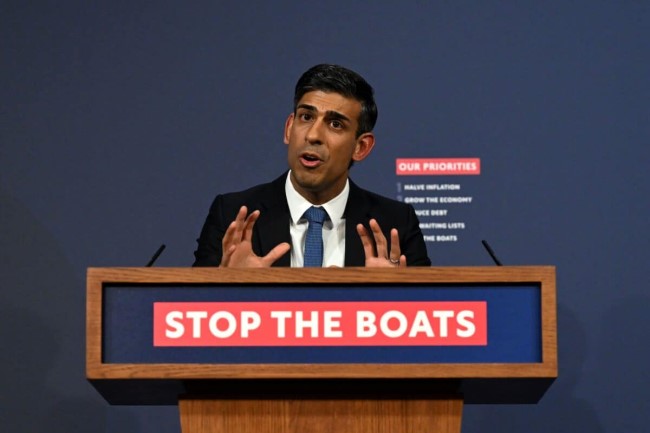Tories announce ‘biggest cut in net migration’ and we’re punching holes in their plan

Rishi Sunak and his priorities: who would have thought that stopping the boats would contradict his plan to reduce inflation?
The following is misleading.
If you’re announcing a plan to cut net migration into the UK, then it hasn’t happened yet. The following tweet is therefore misleading.
🚨 BREAKING: @RishiSunak just announced the biggest ever cut in net migration.
Here’s how 👇 pic.twitter.com/8snepqtHM5
— Conservatives (@Conservatives) December 4, 2023
There’s no way of telling whether these measures will actually bring inward migration down.
Also, there’s the issue of unforeseen consequences.
First, here’s another misleading message from Rishi Sunak. See my response to understand why it’s wrong:
What does Rwanda have to do with stopping boats on the English Channel? Nothing.
You seem confused.
— Mike Sivier (@MidWalesMike) December 5, 2023
Again, to remind you: The treaty with Rwanda that James Cleverly was sent to sign has nothing to do with stopping criminal gangs from transporting refugees (or whoever) across the English Channel.
It is merely an attempt to bypass the Supreme Court’s ruling that Rwanda is not a safe place to send them once they have arrived in the UK.
Now, about those unforeseen consequences…
When Sunak says he will “end abuse via the Health and Care Visa, he means he will prevent care workers moving to the UK for employment from bringing their families. This will also apply to overseas students.
This will turn away expertise that the UK needs.
Tory voices like that of Brendan Clarke-Smith are already whispering that foreign workers will still come, because the UK is “a fantastic country”:
#Ridge: You're saying care workers won't be allowed to bring over their families
Brendan Clarke-Smith(Tory MP): We'll still get those people… b/c it's a fantastic country#Ridge: But only if they leave their kids at home#politicshub pic.twitter.com/LrQTZmhMmP
— Haggis_UK 🇬🇧 🇪🇺 (@Haggis_UK) December 4, 2023
Is it?
How desperate must people be to want to live here? In an England where Disabled ppl are treated like criminals breaking laws, where the poor are looked upon as parasites, where terminally ill people don’t have the support they need because Tory MPs are stealing taxpayers money! https://t.co/ROYMwbJ4BI
— ♿️🇵🇸🏳️⚧️🏳️🌈🕸️⚫️MaiaB (@MaiaBug2010) December 5, 2023
It seems unlikely that highly-qualified people, who could earn a better living anywhere else in the world, would willingly give up their kith and kin to work in a country that will not appreciate their efforts and that – certainly in the case of health and care – treats its own people so badly.
No worries, though! Immigration Minister Robert Jenrick reckons workers from the UK will fill the gaps:
Immigration Minister Robert Jenrick insists UK workers will fill labour gaps after migration crackdown https://t.co/DqqjsWoZXP
— BBC Politics (@BBCPolitics) December 5, 2023
He said UK businesses would no longer have the option of hiring cheap labour from overseas, meaning they would have to “invest in the domestic workforce”.
Why should they?
Big businesses are more likely to preserve their profits by moving out of the UK altogether and hiring all that cheap foreign labour abroad, where it’s still cheap.
And small or medium-sized enterprises are not likely to be able to afford the kind of investment Jenrick is suggesting.
He went on to appear on Sky News, supporting the remaining point in the five-point plan – ensuring that people sponsoring dependents, who do come with them to the UK, can support them financially:
Tory govt minister Robert Jenrick says someone needs to earn £38,700/year to be able to support a family
He's admitting that in modern Britain many nurses, posties, delivery drivers, call centre workers, teachers, shop workers, bus drivers, carers etc can't afford families pic.twitter.com/SHWKnq3TBT
— Saul Staniforth (@SaulStaniforth) December 5, 2023
So the overall implication of this plan is that it is an attempt to nudge businesses into paying higher salaries to people working in the UK.
This appears to be an attempt to steal a policy from Reform UK, whose leader Richard Tice had already spoken in favour of higher wages and investment in people:
"You need higher wages and to train people… the domestic wages are way too low because we've imported cheap labour"
Reform UK Leader Richard Tice says continued high immigration will drive down GDP per annum, the country needs to focus on upskilling the domestic workforce pic.twitter.com/XhU7PVNv0o
— BBC Newsnight (@BBCNewsnight) December 4, 2023
Opinion polls have suggested that right-wing voters are, themselves, migrating – from the Tories to Reform UK. This anti-immigration policy may be an attempt to woo them back.
But – perhaps crucially – this is a policy turnaround for the Tories, who have previously argued that increased pay for working people is inflationary:
Raise wages then you can do that you could have done that but you blamed workers asking for a pay rise drivers of Inflation. So which is it pay drives inflation or creates employment or you want to pretend low pay is driven by immigrants and not greedy bosses and politicians
— Ian Hodson (@IanBFAWU) December 5, 2023
TL;DR: this supposedly anti-immigration policy seems to be intended more as a way of stemming the flow of voters to Reform UK. Its stated aim of increasing pay contradicts Tory policy on inflation and is more likely to move businesses out of the UK than bring investment in.
